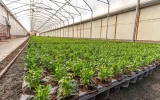Smallholding Planning Law Explained: Full Guide
Smallholding Planning Law is a comprehensive legal framework that covers a wide range of legal issues related to the ownership, use, and management of rural land. This guide is the ultimate resource for anyone looking to learn about the laws and regulations surrounding the ownership of a smallholding.
Smallholding planning laws are in place to protect the areas of land used primarily for agricultural purposes. They protect the environment from any potential damage caused by development or overuse. These laws ensure that landowners are given the permissions and guidance they need to maintain a sustainable smallholding.
From acquiring a smallholding to the legal requirements and duties of owning one, get the most up-to-date information on planning and zoning laws, permits, and more here.
Summary
- Smallholding Planning Law is a set of regulations and guidelines that govern the use of land for smallholding purposes.
- The law covers topics like the types of activities that can be undertaken, the standards of construction, the size and layout of the land, and more.
- This law aims to ensure that smallholdings are constructed in a way that is environmentally friendly and has minimal impact on local communities.

On this page:
Smallholding Planning Law Is A Set of Regulations For Smallholdings
Smallholding Planning Law governs the use of smallholdings, which are small parcels of land used for agricultural purposes. The regulations cover the size of the smallholding, the types of activities that can take place on it, and the necessary infrastructure for it to be used for agricultural purposes.
Smallholding Planning Law also regulates the zoning and use of land, such as ensuring that the smallholding is not used for residential purposes or industrial activities, and the necessary permissions and licenses that must be obtained.
Smallholding Planning Law is a complex system that requires a detailed understanding of local and national laws, as well as an understanding of the relevant planning regulations. It also covers the rules and regulations regarding the use of fertilizers and pesticides, the protection of the environment, and the safety of workers and animals in the smallholding.
Additionally, Smallholding Planning Law regulates the taxation of smallholdings and the potential for the sale or rent of the land.
Laws And Regulations Surrounding The Ownership Of A Smallholding
To own a smallholding, these laws and regulations should be followed to secure land.
- Obtaining permission from the local planning authority to establish a smallholding
- Registering a smallholding with the local authority
- Complying with the relevant regulations and health and safety requirements
- Obtaining livestock licenses and registering with DEFRA
- Ensuring the smallholding is adequately insured
- Registering with the HMRC as a self-employed business
- Complying with the Animal Welfare Act
- Keeping records of all transactions, income, and expenditure
- Paying tax on any income generated from the smallholding
- Keeping the land in good condition and following good agricultural practices

Overview Of The Various Legal Aspects Of Smallholding Planning Law
Smallholding planning law is a complex area of law that is necessary for both smallholders and local authorities to understand and adhere to.
1. Agricultural uses covered in Smallholding Planning Law
Smallholders must understand the local laws and regulations that apply to their agricultural activities, such as those related to land use, zoning, and crop production. They must also be aware of any applicable laws related to livestock management, such as laws on animal welfare and grazing rights.
2. Residential uses included in Smallholding Planning Law
Smallholders must comply with local laws regarding the construction and occupancy of dwellings on their land. This includes laws related to building permits, dwelling size, and occupancy limits.
3. Commercial uses indicated in Smallholding Planning Law
Smallholders must also be aware of laws related to any commercial activities they wish to undertake on their land, such as laws related to business licenses, zoning regulations, and signage.
4. Environmental regulations according to Smallholding Planning Law
Smallholders must also be aware of any environmental regulations that may apply to their land, such as laws related to water and air pollution, land use, and waste management.
Implications Of Smallholding Planning Law
There are implications when it comes to following the smallholding law, such as for landowners, developers, and public bodies.
Implications of Smallholding Planning Law for landowners
Smallholding planning law has implications for landowners in terms of the restrictions they must adhere to and the control they have over the land. Landowners must comply with the local authority’s regulations and planning policies, which may include limits on the size of the smallholding, restrictions on the types of livestock or crops that can be kept, and limits on the amount of land that can be used for any particular activity.
Additionally, landowners may need to apply for planning permission for any changes or additions to the smallholding. They may also be required to provide access for the public and may be subject to restrictions on how the land is used, such as no development or alteration that would harm the environment or disrupt the local community.
Finally, landowners must be aware of any tax implications of owning a smallholding, as well as the liability they may incur if any accidents occur on the property.
Implications of Smallholding Planning Law for developers
Developers must ensure that they create a scheme that is compatible with the surrounding area and is in line with the local authority’s smallholding planning policy. They must understand the local authority’s smallholding planning policy and ensure that their scheme is consistent with it.
Developers must ensure that their scheme does not adversely affect the environment or the interests of neighboring properties. They must seek the necessary planning permission from the local authority before commencing development. They may be required to provide information to the local authority on the scale and nature of their proposed development and the impact it may have on the local area.
Developers may be required to carry out an environmental impact assessment and/or obtain planning permission for certain activities, such as tree felling, that are likely to have a significant impact on the local environment.
They may be required to provide evidence of public consultation and/or address any issues raised by residents. They may also be required to address any potential conflicts between their scheme and the local community’s interests.
Implications of Smallholding Planning Law for public bodies
Public bodies must adhere to the laws and regulations of smallholding planning. This includes the approval of all applications for smallholding development, along with the implementation of policies and procedures to ensure the responsible management of smallholdings.
Public bodies must also ensure that all smallholdings are managed following the principles of sustainable development and are compliant with all relevant local and national planning laws.
Additionally, public bodies must consider the potential impact of smallholding planning decisions on their local communities, including their effects on food production, land and natural resources, and the environment.
Finally, public bodies must ensure that all smallholding development is carried out in a way that is consistent with the conservation and protection of biodiversity.

The Importance of Following The Smallholding Planning Law
Smallholding planning law helps to protect the safety and health of people living and working in the area, by ensuring that all developments are carried out responsibly. It helps to ensure that the environment is not harmed by any developments, by enforcing rules and regulations regarding the use of land and what can be built on it.
It helps to ensure that local wildlife is protected by setting out rules on how to deal with habitats and making sure that any development is done in a way that does not disturb the local wildlife. It helps to protect the interests of all those involved in a smallholding, by setting out clear rules on who is allowed to do what on the land, as well as the rights and responsibilities of all those involved.
It helps to ensure that residents are not disturbed by any developments by setting out rules on noise, light, and other disturbances that can occur. It helps to ensure that any development is done in a way that does not affect the local community, by setting out rules on how to deal with any potential conflicts of interest.



